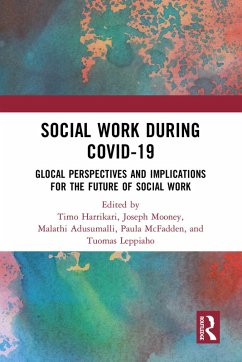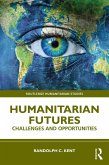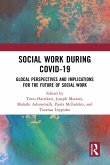Social Work During COVID-19 (eBook, PDF)
Glocal Perspectives and Implications for the Future of Social Work
Redaktion: Harrikari, Timo; Leppiaho, Tuomas; McFadden, Paula; Adusumalli, Malathi; Mooney, Joseph
39,95 €
39,95 €
inkl. MwSt.
Sofort per Download lieferbar

20 °P sammeln
39,95 €
Als Download kaufen

39,95 €
inkl. MwSt.
Sofort per Download lieferbar

20 °P sammeln
Jetzt verschenken
Alle Infos zum eBook verschenken
39,95 €
inkl. MwSt.
Sofort per Download lieferbar
Alle Infos zum eBook verschenken

20 °P sammeln
Social Work During COVID-19 (eBook, PDF)
Glocal Perspectives and Implications for the Future of Social Work
Redaktion: Harrikari, Timo; Leppiaho, Tuomas; McFadden, Paula; Adusumalli, Malathi; Mooney, Joseph
- Format: PDF
- Merkliste
- Auf die Merkliste
- Bewerten Bewerten
- Teilen
- Produkt teilen
- Produkterinnerung
- Produkterinnerung

Bitte loggen Sie sich zunächst in Ihr Kundenkonto ein oder registrieren Sie sich bei
bücher.de, um das eBook-Abo tolino select nutzen zu können.
Hier können Sie sich einloggen
Hier können Sie sich einloggen
Sie sind bereits eingeloggt. Klicken Sie auf 2. tolino select Abo, um fortzufahren.

Bitte loggen Sie sich zunächst in Ihr Kundenkonto ein oder registrieren Sie sich bei bücher.de, um das eBook-Abo tolino select nutzen zu können.
This book focusses on social work in the time of COVID-19. Social workers, their clients, as well as the organisations they represent have been affected by the pandemic in multiple ways.
- Geräte: PC
- mit Kopierschutz
- eBook Hilfe
Andere Kunden interessierten sich auch für
![Humanitarian Futures (eBook, PDF) Humanitarian Futures (eBook, PDF)]() Randolph C. KentHumanitarian Futures (eBook, PDF)36,95 €
Randolph C. KentHumanitarian Futures (eBook, PDF)36,95 €![The Routledge International Handbook of Social Work and Disaster Practice (eBook, PDF) The Routledge International Handbook of Social Work and Disaster Practice (eBook, PDF)]() The Routledge International Handbook of Social Work and Disaster Practice (eBook, PDF)48,95 €
The Routledge International Handbook of Social Work and Disaster Practice (eBook, PDF)48,95 €![Social Work During COVID-19 (eBook, ePUB) Social Work During COVID-19 (eBook, ePUB)]() Social Work During COVID-19 (eBook, ePUB)39,95 €
Social Work During COVID-19 (eBook, ePUB)39,95 €![Climate Change, Small-Scale Fisheries, and Blue Justice (eBook, PDF) Climate Change, Small-Scale Fisheries, and Blue Justice (eBook, PDF)]() Sunil SanthaClimate Change, Small-Scale Fisheries, and Blue Justice (eBook, PDF)40,95 €
Sunil SanthaClimate Change, Small-Scale Fisheries, and Blue Justice (eBook, PDF)40,95 €![Young Children in Humanitarian and COVID-19 Crises (eBook, PDF) Young Children in Humanitarian and COVID-19 Crises (eBook, PDF)]() Young Children in Humanitarian and COVID-19 Crises (eBook, PDF)0,00 €
Young Children in Humanitarian and COVID-19 Crises (eBook, PDF)0,00 €![Psychosocial Responses to Sociopolitical Targeting, Oppression and Violence (eBook, PDF) Psychosocial Responses to Sociopolitical Targeting, Oppression and Violence (eBook, PDF)]() Joshua L. MillerPsychosocial Responses to Sociopolitical Targeting, Oppression and Violence (eBook, PDF)34,95 €
Joshua L. MillerPsychosocial Responses to Sociopolitical Targeting, Oppression and Violence (eBook, PDF)34,95 €![The Routledge International Handbook of Social Development, Social Work, and the Sustainable Development Goals (eBook, PDF) The Routledge International Handbook of Social Development, Social Work, and the Sustainable Development Goals (eBook, PDF)]() The Routledge International Handbook of Social Development, Social Work, and the Sustainable Development Goals (eBook, PDF)48,95 €
The Routledge International Handbook of Social Development, Social Work, and the Sustainable Development Goals (eBook, PDF)48,95 €-
-
-
This book focusses on social work in the time of COVID-19. Social workers, their clients, as well as the organisations they represent have been affected by the pandemic in multiple ways.
Hinweis: Dieser Artikel kann nur an eine deutsche Lieferadresse ausgeliefert werden.
Dieser Download kann aus rechtlichen Gründen nur mit Rechnungsadresse in A, B, BG, CY, CZ, D, DK, EW, E, FIN, F, GR, HR, H, IRL, I, LT, L, LR, M, NL, PL, P, R, S, SLO, SK ausgeliefert werden.
Hinweis: Dieser Artikel kann nur an eine deutsche Lieferadresse ausgeliefert werden.
Produktdetails
- Produktdetails
- Verlag: Taylor & Francis eBooks
- Seitenzahl: 278
- Erscheinungstermin: 28. April 2023
- Englisch
- ISBN-13: 9781000875201
- Artikelnr.: 67537630
- Verlag: Taylor & Francis eBooks
- Seitenzahl: 278
- Erscheinungstermin: 28. April 2023
- Englisch
- ISBN-13: 9781000875201
- Artikelnr.: 67537630
- Herstellerkennzeichnung Die Herstellerinformationen sind derzeit nicht verfügbar.
Timo Harrikari, PhD, is a Professor of Social Work at the University of Lapland and Research Professor in Child Welfare at the Finnish Institute for Health and Welfare THL, Finland. Joseph Mooney, PhD, is Assistant Professor of Social Work at University College Dublin, Ireland, and a former social work practitioner. Malathi Adusumalli¿ PhD, is a Professor at the faculty of University of Delhi with over two decades of teaching experience and over seven years of working actively with grassroots organisations in the field of social action, disaster management, and development. She has published her work in national and international journals and has three books to her credit. She has successfully guided M.Phil. and Ph.D. research scholars. She is a firm believer in anti-oppressive social work practice. Paula McFadden, PhD, is a Senior Lecturer in Social Work at Ulster University and teaches at undergraduate, postgraduate, master's, and PhD levels. Paula's main research interests are centred on workforce wellbeing, resilience, and burnout. Paula has conducted several UK-wide research studies, examining burnout in social workers, workforce ageing in social work, and more recently, wellbeing and coping during COVID-19, for health and social care professions, including social workers. Tuomas Leppiaho, B.Soc.Sc., is a research assistant and a master's student in political sciences at the University of Lapland.
1.Introduction: Social Work through a Pandemic: Living with Complexity,
Mobilising Adaptive Capacity, and Promoting Social Resilience? Section One
- Policies and Governance Framing Social Work Practice. 2.Social Workers'
Response to COVID-19 in Slovenia: The Interconnectedness of Macro, Mezzo,
and Micro Levels of Practice. 3.COVID-19 Social Work in the Expanding
Neoliberal Welfare States. 4.Development of Digital Social Work in the
Early Phase of COVID-19 Pandemic in Slovenia and Finland. Section Two -
Voices from the Field: Facing Challenges and Creating Solutions. 5.UK
Social Worker Burnout and Coping during the First Years of the COVID-19
Pandemic. 6.Social Work during Triple Lockdown: A Restatement of Discourses
in Estonia? 7.Teams Interrupted: Social Work Teams as Communities of
Practice and Coping during COVID-19. 8.Social Work during Crises: Good
Practices and Bottlenecks According to Social Workers in Flanders, Belgium.
Section Three - Vulnerabilities and Adaptive Capacities at the Client
Interface. 9.Social Workers' Context of Practice during COVID-19 in Iran.
10.Experiences of Social Service Officers working at Safe Home during
COVID-19 in Bangladesh. 11.Social Vulnerability of Older Adults and
COVID-19: Findings from Surveys of Professionals Providing Care in Japan.
12.Social Work and Lost Contacts with Clients during the COVID-19 Pandemic:
Experiences of Shared Trauma from Three Different Civil Society
Organisations. Section Four - Restarting the Dynamics, Relationships, and
Connectivity in Social Work. 13.'And I Say, "Yes" Because I Want to
Help'-Social Workers Reflections on Practice in Ireland during COVID-19.
14.Transformative Disruption?-Reflections on Care in Social Work under a
COVID-19 Pandemic Lockdown. 15.A Shift in Social Interaction in Social Work
during the COVID-19 Pandemic. 16.COVID-19 as a Game Changer for the
Digitalisation of Social Work. Section Five - Conclusion. 17.Social Work
through Pandemic: Conclusions, Lessons Learned, and Future Orientations.
Mobilising Adaptive Capacity, and Promoting Social Resilience? Section One
- Policies and Governance Framing Social Work Practice. 2.Social Workers'
Response to COVID-19 in Slovenia: The Interconnectedness of Macro, Mezzo,
and Micro Levels of Practice. 3.COVID-19 Social Work in the Expanding
Neoliberal Welfare States. 4.Development of Digital Social Work in the
Early Phase of COVID-19 Pandemic in Slovenia and Finland. Section Two -
Voices from the Field: Facing Challenges and Creating Solutions. 5.UK
Social Worker Burnout and Coping during the First Years of the COVID-19
Pandemic. 6.Social Work during Triple Lockdown: A Restatement of Discourses
in Estonia? 7.Teams Interrupted: Social Work Teams as Communities of
Practice and Coping during COVID-19. 8.Social Work during Crises: Good
Practices and Bottlenecks According to Social Workers in Flanders, Belgium.
Section Three - Vulnerabilities and Adaptive Capacities at the Client
Interface. 9.Social Workers' Context of Practice during COVID-19 in Iran.
10.Experiences of Social Service Officers working at Safe Home during
COVID-19 in Bangladesh. 11.Social Vulnerability of Older Adults and
COVID-19: Findings from Surveys of Professionals Providing Care in Japan.
12.Social Work and Lost Contacts with Clients during the COVID-19 Pandemic:
Experiences of Shared Trauma from Three Different Civil Society
Organisations. Section Four - Restarting the Dynamics, Relationships, and
Connectivity in Social Work. 13.'And I Say, "Yes" Because I Want to
Help'-Social Workers Reflections on Practice in Ireland during COVID-19.
14.Transformative Disruption?-Reflections on Care in Social Work under a
COVID-19 Pandemic Lockdown. 15.A Shift in Social Interaction in Social Work
during the COVID-19 Pandemic. 16.COVID-19 as a Game Changer for the
Digitalisation of Social Work. Section Five - Conclusion. 17.Social Work
through Pandemic: Conclusions, Lessons Learned, and Future Orientations.
1.Introduction: Social Work through a Pandemic: Living with Complexity,
Mobilising Adaptive Capacity, and Promoting Social Resilience? Section One
- Policies and Governance Framing Social Work Practice. 2.Social Workers'
Response to COVID-19 in Slovenia: The Interconnectedness of Macro, Mezzo,
and Micro Levels of Practice. 3.COVID-19 Social Work in the Expanding
Neoliberal Welfare States. 4.Development of Digital Social Work in the
Early Phase of COVID-19 Pandemic in Slovenia and Finland. Section Two -
Voices from the Field: Facing Challenges and Creating Solutions. 5.UK
Social Worker Burnout and Coping during the First Years of the COVID-19
Pandemic. 6.Social Work during Triple Lockdown: A Restatement of Discourses
in Estonia? 7.Teams Interrupted: Social Work Teams as Communities of
Practice and Coping during COVID-19. 8.Social Work during Crises: Good
Practices and Bottlenecks According to Social Workers in Flanders, Belgium.
Section Three - Vulnerabilities and Adaptive Capacities at the Client
Interface. 9.Social Workers' Context of Practice during COVID-19 in Iran.
10.Experiences of Social Service Officers working at Safe Home during
COVID-19 in Bangladesh. 11.Social Vulnerability of Older Adults and
COVID-19: Findings from Surveys of Professionals Providing Care in Japan.
12.Social Work and Lost Contacts with Clients during the COVID-19 Pandemic:
Experiences of Shared Trauma from Three Different Civil Society
Organisations. Section Four - Restarting the Dynamics, Relationships, and
Connectivity in Social Work. 13.'And I Say, "Yes" Because I Want to
Help'-Social Workers Reflections on Practice in Ireland during COVID-19.
14.Transformative Disruption?-Reflections on Care in Social Work under a
COVID-19 Pandemic Lockdown. 15.A Shift in Social Interaction in Social Work
during the COVID-19 Pandemic. 16.COVID-19 as a Game Changer for the
Digitalisation of Social Work. Section Five - Conclusion. 17.Social Work
through Pandemic: Conclusions, Lessons Learned, and Future Orientations.
Mobilising Adaptive Capacity, and Promoting Social Resilience? Section One
- Policies and Governance Framing Social Work Practice. 2.Social Workers'
Response to COVID-19 in Slovenia: The Interconnectedness of Macro, Mezzo,
and Micro Levels of Practice. 3.COVID-19 Social Work in the Expanding
Neoliberal Welfare States. 4.Development of Digital Social Work in the
Early Phase of COVID-19 Pandemic in Slovenia and Finland. Section Two -
Voices from the Field: Facing Challenges and Creating Solutions. 5.UK
Social Worker Burnout and Coping during the First Years of the COVID-19
Pandemic. 6.Social Work during Triple Lockdown: A Restatement of Discourses
in Estonia? 7.Teams Interrupted: Social Work Teams as Communities of
Practice and Coping during COVID-19. 8.Social Work during Crises: Good
Practices and Bottlenecks According to Social Workers in Flanders, Belgium.
Section Three - Vulnerabilities and Adaptive Capacities at the Client
Interface. 9.Social Workers' Context of Practice during COVID-19 in Iran.
10.Experiences of Social Service Officers working at Safe Home during
COVID-19 in Bangladesh. 11.Social Vulnerability of Older Adults and
COVID-19: Findings from Surveys of Professionals Providing Care in Japan.
12.Social Work and Lost Contacts with Clients during the COVID-19 Pandemic:
Experiences of Shared Trauma from Three Different Civil Society
Organisations. Section Four - Restarting the Dynamics, Relationships, and
Connectivity in Social Work. 13.'And I Say, "Yes" Because I Want to
Help'-Social Workers Reflections on Practice in Ireland during COVID-19.
14.Transformative Disruption?-Reflections on Care in Social Work under a
COVID-19 Pandemic Lockdown. 15.A Shift in Social Interaction in Social Work
during the COVID-19 Pandemic. 16.COVID-19 as a Game Changer for the
Digitalisation of Social Work. Section Five - Conclusion. 17.Social Work
through Pandemic: Conclusions, Lessons Learned, and Future Orientations.







